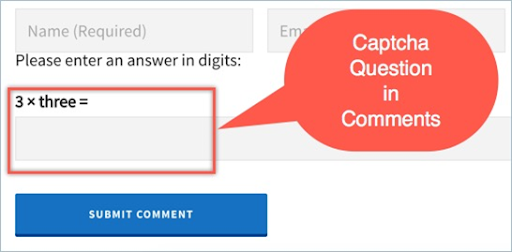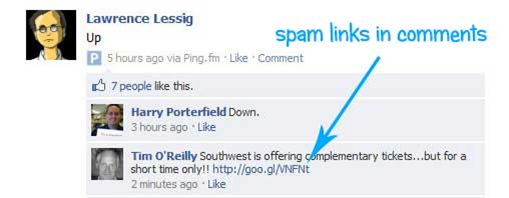How to Stop Spam Comments
By Quan Nguyen
September 3, 2021
If you have spent some time on the internet, you most likely have come across spam comments. It is almost impossible to visit sites including comment and interactivity features without encountering spam. In fact, Statista reports that 55.4% of YouTube comments removed in early 2021 were due to spam. The increasing expanse of shared data on social media sites allows people to leave any message on your media if left uncontrolled. While seemingly harmless, a buildup of spam comments on social media pages or websites can lead to reputational damage and penalizations for businesses in search engine rank. Let’s take a look at how and why you should prevent spam comments on your media.
What is Spam and Why Does it Appear?
Spam is generally described as unsolicited, unrelated content – and in this case, content that does not add value to a media post. Indicators of spam comments may include:
- Outbound links
- Excessive commenting
- Generic or unrelated discussion
- Obvious keywords
- Any correspondence posing a threat/inconvenience
Spam is also found in the form of email or phone messages, but these types are easily preventable.
Most spammers’ intentions are not to clutter the comment section, but rather promote their own content or website. Purchasing spam comments is unfortunately quite easy; so many businesses can take advantage of this practice. For example, Instagram page owners can buy customizable comments to either boost their post or drive traffic to their page from other pages. Similar processes of purchasing comments or hiring bots are applicable to other media with commenting features.
Reasons to Remove Spam Comments
Websites are concerned with ranking well on search engines like Google. Google’s search algorithm has a history of dealing with spam links and businesses purchasing backlinks; this means that spam comments could hurt Search Engine Optimization (SEO). If your website is overrun with spam comments, say on a blog post, Google may penalize your standing in page rank or completely remove your site on the results page. This poses a major issue for site owners by limiting traffic.
For social media apps like Facebook, Instagram, YouTube, and Twitter, spam comments can damage pages’ reputation and risk followers’ safety. Spammers that leave outbound links are likely initiating phishing scams to steal data from people that click on them. Spam comments also leave a bad impression on your page; irrelevant comments are annoying and distracting for some users, which can cause them to devalue your businesses’ legitimacy.
Regardless, it is better to take precautions to prevent spam before it even gets posted. Here are some general solutions to stop spam comments in advance:
- Moderating the comments yourself and deleting ones that seem like spam, also allowing you to spot comments that might otherwise need deletion (such as harassment)
- Incorporating some bot prevention like Google’s CAPTCHA or reCAPTCHA to prevent fake users from mass commenting
- Require that commenters create accounts using verified emails or phone numbers
- Allow verified users to flag spam but take caution in how users may misuse this feature
- Turn off commenting completely

The above steps are great starting points to mitigate spam comments on all platforms. Let’s go one step further and explore how to reduce spam on specific media platforms.
WordPress
There are numerous options for site owners to develop a website these days instead of manually writing the HTML and CSS code. Websites are now often built using website builders like WordPress, which powers 64 million websites or roughly 40% of the internet.
A powerful feature of WordPress is its use of plugins. Plugins are a staple of expanding the use of a WordPress website. With plugins, site owners can manage comments and IP addresses to filter spam. Askimet Spam Protection is a common plugin that automatically checks and filters comments that look like spam, reveals full URL links, and gives developers tools to monitor users’ comment history. Other plugins like Jetpack and CleanTalk’s Spam protection, Antispam, Firewall use Askimet Spam Protection but offer even more features. Jetpack includes several security features like automatic malware scans and automatic site back-ups, while CleanTalk’s plugin focuses more on spam mitigation using firewalls, anti-crawlers, blocking by country, and more.
YouTube
YouTube automatically holds comments for review if they are deemed “likely spam” based on text and repeated behavior. Other users can also mark comments as spam on videos or even the videos themselves. For YouTubers that want to take it a step further, they can navigate to YouTube Creator Studio > Settings > Community > Automated Filters. This window gives content creators a selection of spam filters that whitelist/blacklist users in their comments section and restrict certain words and links.
Facebook & Instagram
Facebook remains the largest social media platform with its subsidiary, Instagram, the fifth largest. These platforms are known for their abundance of bots running fake accounts and are prone to spam and hacking. Instagram claims to automatically filter comments on spam and other factors like offensive comments, but you can improve that filter. For both Facebook and Instagram, you can enable manual filtering of keywords in which comments containing your choice of keywords become hidden.
Facebook page owners can navigate to their page and enable word filtering by clicking Settings (left menu) > Page Moderation > then enter words/phrases/emojis separated by commas for comment and post filtering. Similarly, Instagram users can navigate to Settings > Privacy and Security > Edit Comment Settings > then enter comma-separated keywords. If you are not a content creator, you can also consider making your profile private since spammers mostly target public profiles.

Takeaways
It can be difficult to track all your comments especially if you have a large user base. In such cases, there are likely spam comments that need to be dealt with before consequences ensue. Depending on the platform of your content, you can manage spam by disabling comments, moderating comments, using WordPress plugins, or filtering content.
Similar to CAPTCHA or registered logins, you can partner with humanID to verify non-bot users before commenting. humanID is an anonymous login that requests your phone number and creates an associated, irreversible identifier, or hash. Your phone number is deleted from humanID’s database after and the hash is used to authenticate you. It is a quick process that can help eliminate spam comments from bot accounts. With a lesser presence of spam comments, your website is at lower risk of dropping on Google listings and your social media audience is safer.


